
Joe Fernald, founder of Winnipesaukee Whisker Oil Co. Courtesy photo.
Throughout his 24-year teaching career, Joe Fernald grew a beard, the kind that announced, “cool English teacher.” What wasn’t cool was searching for beard oil he liked. For the naked-faced among us, beard oil softens beards and moisturizes the skin beneath them that can become dry and itchy.
Frustrated, Fernald decided to make his own oil, developing one with a scent he describes as, “woodsy with a middle note that’s citrus. It’s smooth, but bold. It’s not medicinal,” he says. “I wanted it to be distinctly manly.”
School colleagues and students began asking what smelled good and when he told them beard oil, Fernald says they started requesting their own.
That led Fernald to launch Winnipesaukee Whisker Oil Co. out of his former home in Wolfeboro in October 2017, selling his oil online and at expos and festivals. By December, he got a call from Black’s Paper Store, a gift shop in Wolfeboro, asking to carry his product. “They called me within two days to say the stuff was flying off the shelves,” says Fernald. Suddenly, his hobby became something more.
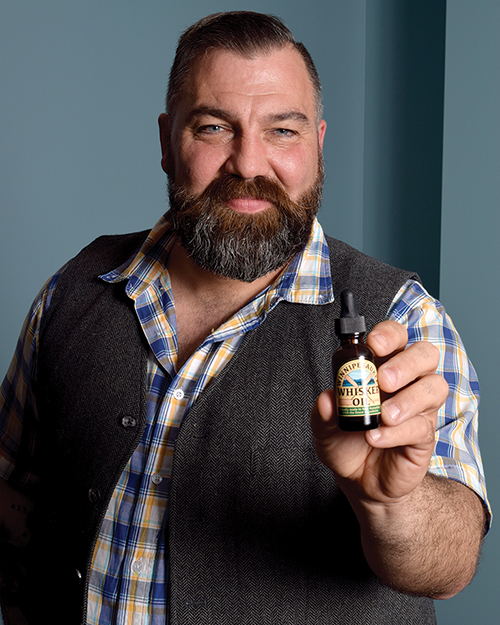
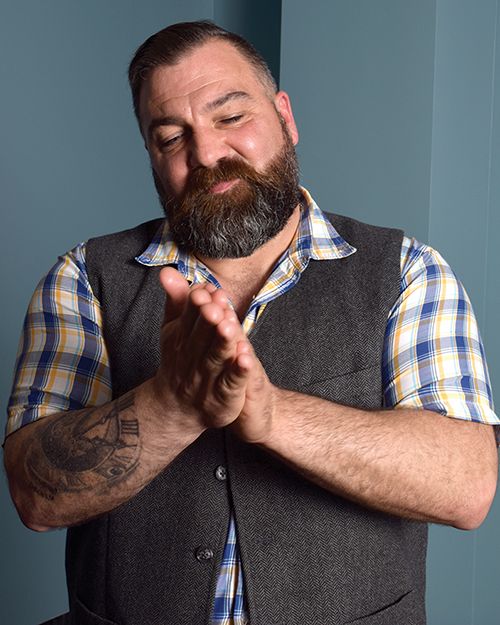
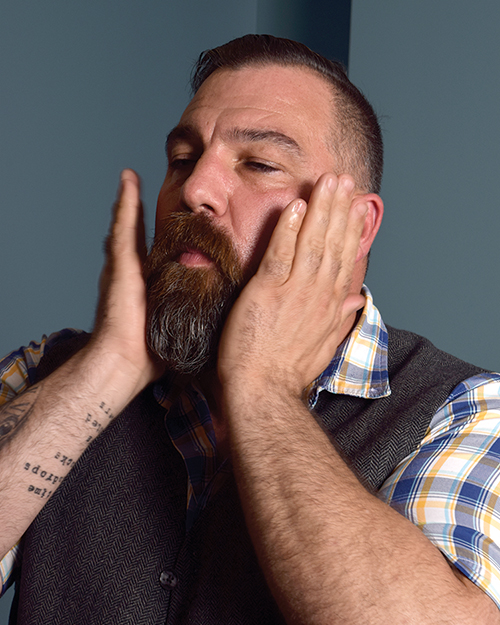
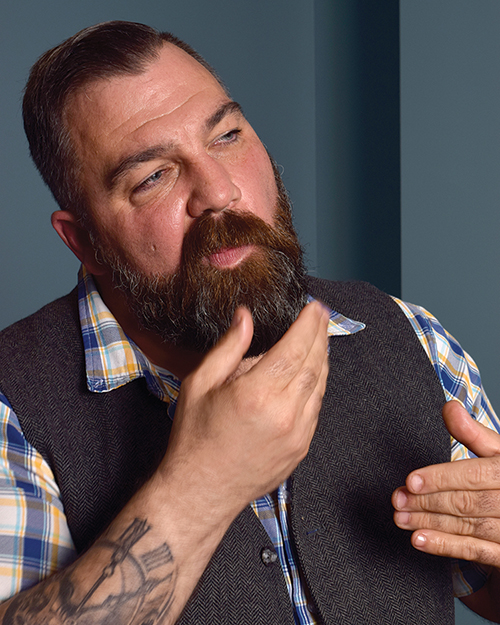
Joe Fernald demonstrates the application of his whisker oil. Photos by Christine Carignan.
“It’s been a whirlwind,” he says. “I haven’t been to an expo where I haven’t sold out.” Fernald quit teaching to work on Winnipesaukee Whisker Oil Co. full time, relocated to Madison and built a production facility on his property to keep up with demand. Winnipesaukee Whisker Oil is sold in 10 stores and barbershops, Fernald says.
Fernald isn’t the only entrepreneur tapping into a resurgent love of beards. Whether bushy or close-cropped, beards have come raging back into style, creating a cottage industry to maintain them. Beard culture is a thing with entire websites and Instagram feeds dedicated to celebrating this symbol of masculinity.
The Mainstreaming of Beards
A few years ago, beards became a Millennial uniform of sorts, replete with plaid shirts. But these beards were not scraggly, but rather well kempt and obviously groomed. They were dubbed “lumbersexuals,” an evolution of the metrosexual movement of the ’90s.
Once a sign of a slacker, beards are much more acceptable, with athletes, celebrities and CEOs getting in on the trend. More than half of men are growing beards with 33 percent of male U.S. consumers in 2017 reporting always sporting them and another 27 percent occasionally growing them, per Statista. The market data firm goes on to report that 25 percent of the bearded use grooming products daily.
The only thing fuzzier than beards is the scope of the beard product industry, which is challenging to track down. Oils and softeners represent less than 1 percent of the “men’s prestige beauty market;” though new products coming to market have quadrupled since 2014, according to Reports And Data, a New York market intelligence and strategic consulting firm that also forecasts men’s shaving products could grow to $3.37 billion by 2020.
This trend means additional income for barbers and salons. Varnished in Manchester, billed as “a gentleman’s salon and shave parlor,” sells $1,000 worth of product per week, including beard oils and balms, says Owner Brett Sellingham.
NH Manufacturers
Entrepreneurs like Fernald are counting on future growth as competition in the beard oil segment heats up. About 70 percent of Winnipesaukee Whisker Oil sales are to wholesale accounts, including barber shops.
Fernald says he is excited for “beard season,” which starts every September. This is when guys who grow beards for only part of the year begin growing them out again, he notes. It’s also when newcomers tend to experiment. “I love ‘Movember’,” Fernald says of an annual event of quitting shaving in November to raise awareness of men’s health issues. “That kicks me into Christmas,” Fernald says, when his business experiences another boost from those looking for unique gifts.
Fernald is branching out beyond beards. His new products not only include a beard balm that helps to shape a beard, but also “Knob Polish,” a moisturizer for those who shave their heads, and a tattoo product. “Tattoos and skin age. They need to be retouched every 10 years,” says Fernald, who wanted to develop an astringent to tighten skin and brighten tattoo colors. He is fielding requests for the tatoo product from wholesalers across the country.
The popularity of such products indicates that men are investing in their appearances more. However, products need to also appeal to women, who often purchase products for the men in their lives, Fernald and other manufacturers say.
Fernald walks the line between packaging geared toward men and promoting the natural and organic aspect of his products to draw women. He sells 300 units or more a month. Men are willing to pay more for grooming products than in the past.
Winnipesaukee Whisker Oil retails for $14 per bottle.
Beard products are being added to lines of more established NH companies as well. Sam’s Natural, produced by Naturally Uncommon in Atkinson, and W.S. Badger in Gilsum both landed a few years ago on a “Men’s Journal” list of “Best Beard Oils to Tame Your Beard.”
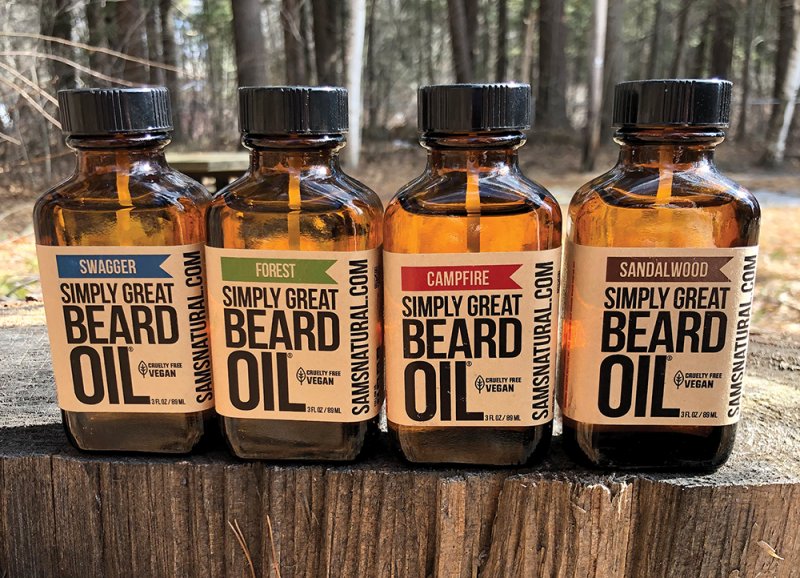
Naturally Uncommon makes plant-based products; chief among them deodorant, as well as soaps, soy candles, lip balms and a walnut-husk hand scrub, sold under the Sam’s Natural brand. However, 15% of Naturally Uncommon’s total sales, which range between $3 million and $5 million annually, is derived from its line of “Simply Great Beard Oil.”
Sam’s Natural accounts for half the company’s sales while the other half comes from contract manufacturing, says Michael Ayles, president and CFO of Naturally Uncommon. He and his business partner, Hank DeWol, acquired the company three
years ago.
Since then, the duo has led the eight-year-old company through significant growth, doubling the size of the manufacturing facility to 10,000 square feet. The two plan to add 5,000 square feet in the next six months.
Naturally Uncommon, with 20 employees, is shifting its focus away from contract manufacturing to grow the Sam’s Natural brand. About 85 percent of Naturally Common’s revenue is generated through ecommerce and 350 retailers sell its products nationwide, including a handful of Whole Foods around Boston, Ayles says.
Naturally Uncommon’s emphasis on natural ingredients is key. “People are increasingly interested in what they are putting on their body as well as in their body,” says Ayles. To appeal to the modern consumer, the company markets its $9.95 beard oils with catchy names, such as Swagger, Lumberjack, Forest and Barbershop, and offers scents like sage lime, coconut, whiskey and bay rum.
While the products are oriented to men, Ayles agrees women are an important customer base. “It’s important to us that our brand is female friendly,” he says.
While Ayles sees deodorants as the next growth market; he believes beard oil has staying power, having been part of the company’s product mix since the beginning. “There was a hipster trend, which has come and gone and people thought it would be the death of beard oil. But it wasn’t. … I don’t see it going away anytime soon,” he says.
W.S. Badger, known for its natural balms and body care products, introduced a men’s shaving kit with beard oil in 2014. “It turned out the beard oil was the best selling of all the products in that line,” says Rebecca Hamilton, co-CEO. The business also offers a beard balm that moisturizes and styles, and a moustache wax.

W.S. Badger’s men’s care product line. Courtesy photo.
Hamilton says when Badger entered the beard market, there was not much competition. But the market has exploded in the past two years, she says. “It seems to be there is pride in how people grow beards, which is why there is more interest in products for beards,” Hamilton says.
That interest spurred Jeff Waring, a carpenter, and Rick Lindof, a barber and the co-owner of Polished Man Barbershop and Lounge in Merrimack and Nashua, to develop and launch their own beard oil—Killer Beard Oil—in 2014. The duo have released five beard oils and a beard balm since then. While the products initially sold in barbershops, in 2016 the two were contacted by Whole Foods and their wares were placed on the shelves of four regional stores.
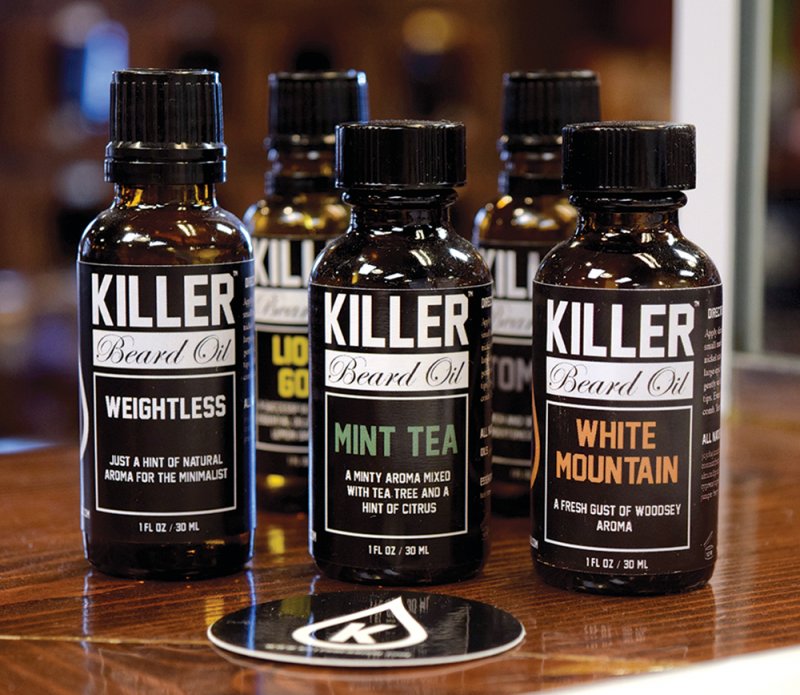
An assortment of Killer Beard Oil products. Photo by Christine Carignan.
Killer Beard Oil sales have grown 50 percent year over year, Lindof says, generating $75,000 in revenue in 2018. While Killer Oil is their “side gig,” it is one he and Waring intend to grow, he says. “The customer I love is the customer who wants to be educated—a guy with a beard who has problem areas, and we become part of their daily routine.” The top selling Killer Oil product is Tom Cat, which has a smoky lavender scent. Killer Oil also offers Liquid Gold, a lemon-scented balm; White Mountain, which has a “woodsy” aroma; Mint Tea; and a non-scented oil.
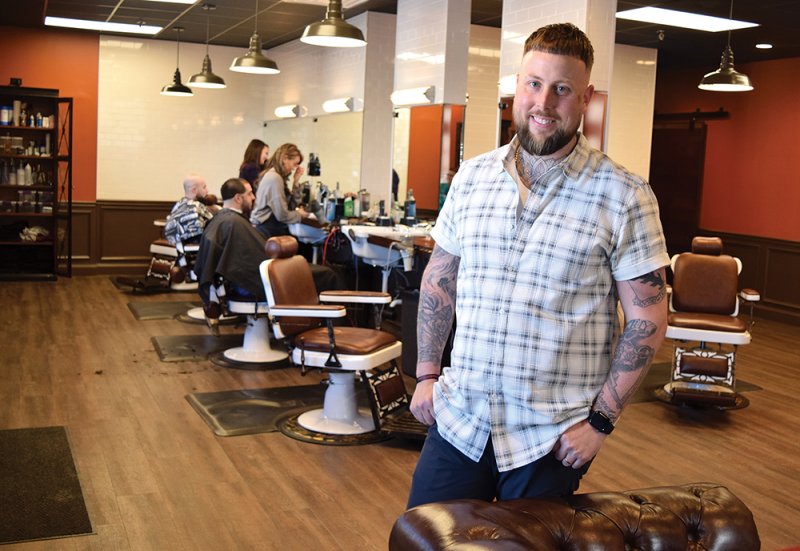
Rick Lindof, co-founder of Polished Man Barbershop and Lounge and Killer Beard Oil. Photo by Christine Carignan.
Barbershop Revival
And that’s just beard-related products. Keeping a beard kempt is helping to drive a revival of neighborhood barbershops, as millennial men seek pampering…but in a totally manly way. IBISWorld reports U.S. barbershop revenue reached $3.7 billion in 2018, having grown every year since 2013. “Barbers are generating more money per person in 2018 than they did in 2013 alone, as specialized services are becoming more popular,” the report states.
Lindof of Polished Man Barbershop and Lounge says men coming in for both haircuts and beard trims account for about half his business. Haircuts and beard trims also make up the bulk of business at Lucky’s Barbershop and Shave Parlor in Concord and Portsmouth, says Owner Josh Craggy. He reports an uptick over the past three years in customers requesting beard-related services, beard grooming products and lessons on how best to use the products.
Of the dozen employees at Lucky’s, 10 sport a beard. “People without facial hair are in the minority,” Craggy says. “Beards have become more natural and fuller,” as opposed to the “chin strap” fashion of the ’90s and early 2000s,” he notes.
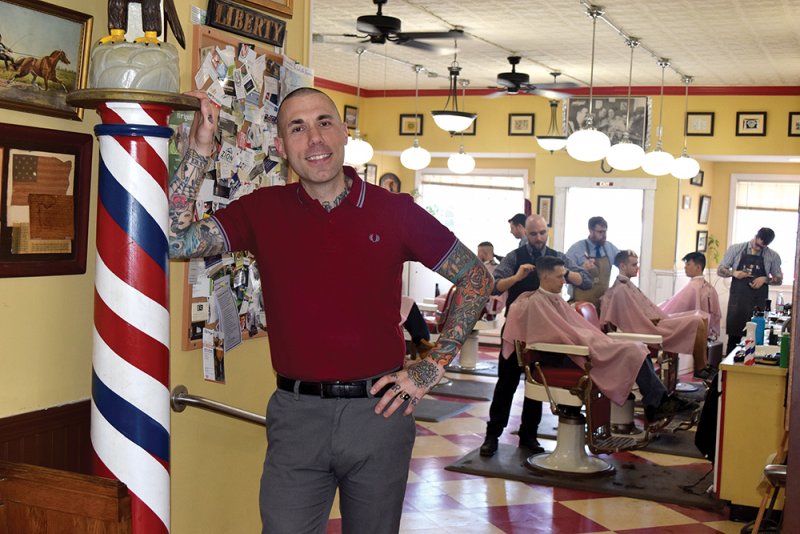
Josh Craggy, owner of Lucky’s Barbershop and Shave Parlor. Photo by Christine Carignan.
Many men want a professional trim and shaping to get the look right, but they are particular about who they let near their beard, says Dave Pothier, owner of Wilfred’s Barbershop in Nashua. “Guys with beards take super pride in them,” he says. “There are not too many people trained in cutting, shaping and styling beards.”
David Caron, owner of the New England School of Barbering in Concord, agrees, explaining beard maintenance goes beyond a trim. “People want to sculpt their beards and color their beards,” he says. “Beards, like tattoos, are a method of expression.”
